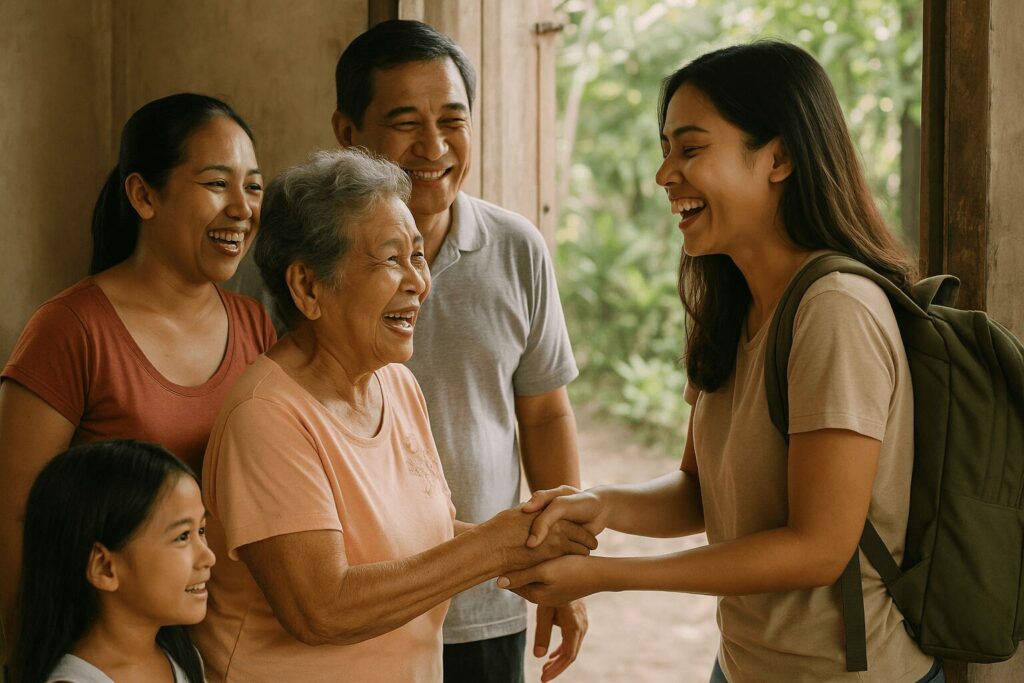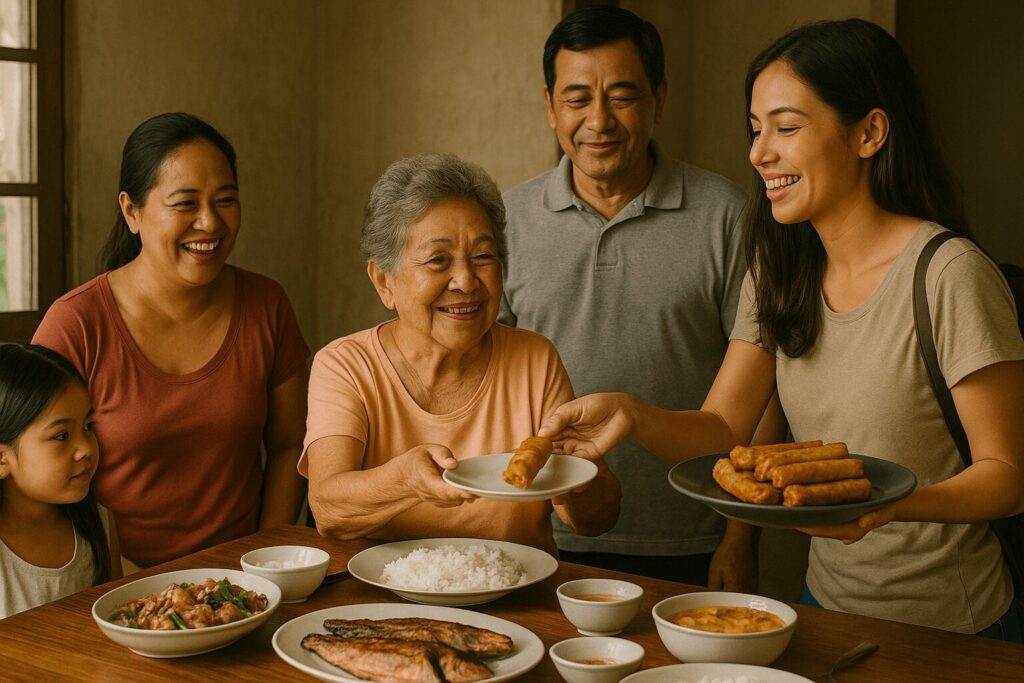
Filipino Hospitality: Family, Bayanihan Spirit 💛
Ever wondered why Filipino hospitality feels like a warm hug from a long-lost friend? 🤗✨ As we mentioned in our article related to the definition of ecotourism, cultural customs sometimes overflow way outside territory borders. While many cultures value kindness, the Philippines turns it into an art form—roots in family, Bayanihan spirit, and feasts that make your stomach (and heart) full. 🍛💥 This piece unpacks how Filipino values transform strangers into kababayan (townmates), the history behind that smiley resilience, and why global industries can’t stop raving about it. Spoiler: it’s not just “nice” vibes—it’s a cultural superpower. 🌏🔥
Article Takeaways
Filipino hospitality is deeply rooted in family values, generosity, and the spirit of “bayanihan.” Guests are naturally treated as family, with overflowing meals, personal sacrifices, and unwavering warmth. These traditions stem from pre-colonial community bonds and influences from Spanish, Chinese, and Malay cultures. Today, this cultural strength drives the Philippines’ global reputation and booming hospitality industry. Ultimately, Filipino hospitality is a true cultural superpower, turning strangers into kin wherever they are in the world.
Table of contents
- The Heart of Filipino Hospitality: More Than Just Warmth
- Filipino Hospitality in Action: Everyday Expressions
- Cultural Roots: The Origins of Filipino Hospitality
- Filipino Hospitality Beyond the Home: A Global Reputation

The Heart of Filipino Hospitality: More Than Just Warmth
At its core, Filipino hospitality isn’t just politeness—it’s a cultural cornerstone blending family, respect, and generosity. Think of it as turning strangers into “kababayan” (townmates) through phrases like “Kain na” (Let’s eat!) or offering beds even when resources are tight. In 2019, this magnetic vibe pulled 8.26 million foreign visitors, proving it’s not just a vibe—it’s identity. 🌟
Driven by “bayanihan” (communal unity) and “utang na loob” (debt of gratitude), Filipino values make guests feel like kin. Hosts prioritize comfort over convenience, like insisting you eat until you’re full or rearranging furniture so you have space to sleep. Even with budget limits, leaving hungry? Never. By 2025, this tradition fuels a $7.65B hospitality market—showcasing how respect, generosity, and family-first vibes create a cultural superpower. 💪
Filipino Hospitality in Action: Everyday Expressions
Welcoming Guests Like Family: The Filipino Way
Step into any Filipino home and boom—you’re family. 🏠💖 Phrases like “Tuloy po kayo!” (Please come in!) and “Parang kapamilya ka na din namin” (You’re like family!) aren’t just polite—they’re reflexes. Even if you’re a total stranger, expect hugs, laughter, and maybe a quick “Kumusta ka na?” (How are you?) before you’ve even caught your breath. It’s not just friendly; it’s automatic. 🤝✨
Got zero space? No problem. Filipinos will literally move furniture to make room for you. 🛏️ “Tuloy po kayo!” isn’t just a phrase—it’s a lifestyle. Whether you’re crashing for an hour or a week, hosts prioritize your comfort, even if it means squeezing into a single bed themselves. And don’t even think about refusing a snack; offering food is non-negotiable. Hungry or not, kain muna (eat first) is the law. 🍚🍴

The Central Role of Food: Feeding with Love
- “Kain na!” (Let’s eat!) – Instant welcome message
- Lechon (whole roasted pig) at parties = instant party upgrade 🐖
- Communal dining: Shared plates, zero awkwardness
- Rice mountains: Portions scream “Are you sure you’re full?”
- “Kumain ka muna” (Eat first) – Even if you said “no thanks”
Food isn’t just fuel—it’s love language. 🍛💬 Refusing a meal? Good luck. Filipinos will offer 3x, and skipping means they’ll stress about your well-being. Ever. The. More. The. Merrier. At gatherings, dishes like adobo and sinigang hit the table with a side of “Take leftovers home!”—because empty stomachs are a crime. 🔥
Don’t expect tiny portions. 🍚Overflow! Meals are full-on feasts, even if it’s just a random Tuesday. Take Purple Yam in New York—a Michelin-starred spot serving mouthwatering dishes that scream “We care!” Even humble homes lay out banana cue or halo-halo like it’s a royal banquet. Abundance = affection. 🍮👑
Going Above and Beyond: Sacrifice for Guests’ Comfort
Ever meet a host who offers their bed while they sleep on the floor? 🛑🛌 That’s Filipino hospitality. Priorities flip: Your comfort > theirs. Forgot your charger? They’ll unplug theirs. Need a ride? They’ll bike 10km. It’s not “no big deal”—it’s automatic. 💪
But it’s not just physical stuff. 💬 Filipinos bond over kwentuhan (chat sessions), asking about your life, hometown, and why you’re obsessed with halo-halo. They’ll drag you to fiestas, insisting, “Ikaw ang VIP ko!” (You’re my VIP!). By the end? You’re not a guest—you’re kasama (part of the crew). 🤝🎉
Cultural Roots: The Origins of Filipino Hospitality
Historical Influences: How Culture Shaped Filipino Values
Spanish, Chinese, and Japanese influences blended with Malay traditions to shape Filipino hospitality. 🌏 Spanish fiestas taught community sharing, while Chinese trade introduced food generosity. Even today, open doors and overflowing plates echo these layers of hospitality Filipino culture—proving history’s flavor never fades. 🍜
Before colonizers arrived, nature Filipino people thrived on barangay bonds. 🏡💡 Sharing rice harvests or sheltering travelers wasn’t just kind—it was survival. These values stuck, turning “guest-first” into a reflex, not a trend. Family, respect, and generosity? Pure pre-colonial DNA. 🧬
Bayanihan: The Community Spirit Behind Filipino Hospitality
“Bayanihan” literally means moving houses—and hearts. 🏘️💫 When Filipinos insist you eat seconds or bike miles to help, they’re channeling this spirit. It’s not about favors; it’s about collective strength. Even after typhoons, neighbors rebuild homes together. Guests? Just part of the “bayan” (community) now. 🤝
- Family-first mindset 🧑🤝🧑
- Respect for elders and strangers 🙏
- Generosity without expectation 💸
- Shared meals, shared lives 🍚
- “Pakikisama” (harmony) in action 🤝
Hosts don’t just open homes—they open souls. 🫶 Filipino family values stretch like taffy, wrapping guests in “kasama” (togetherness). Whether it’s a cousin’s couch or a stranger’s snack, treating guests with kindness isn’t extra. It’s the norm. 🌟

Filipino Hospitality Beyond the Home: A Global Reputation
Filipino Hospitality in Tourism and Business: The Service Excellence
Filipino hospitality isn’t just homegrown—it’s business-ready. 🌍 In tourism, staff go full “kababayan” (townmate) mode: think airport-to-hotel transfers, language translators, and solo travelers getting invited to family dinners. Check this out: 800+ call centers handle millions of global queries daily, blending warmth with flawless English. No wonder the industry’s eyeing $10.95B by 2030! 💼
Businesses don’t just use Filipino hospitality—they weaponize it. 🚀 BPOs thrive on that “kumusta ka?” (how are you?) charm, while hotels like Nüwa Manila win global awards for making guests feel like VIPs. Need proof? In 2025, Nüwa grabbed its 8th Forbes 5-star nod. Why? Staff treat you like family—no script, just heart. 🏆
Global Recognition: The Filipino Reputation for Warmth
Jet-setting? Filipinos are your hype squad. ✈️ Travelers on Reddit and TripAdvisor swear by the “unscripted family vibe”—like strangers sharing rice or hotel staff (shoutout to Jenny and Jerry!) making you feel like home. Getty Images has 12,585 stock photos shouting “warmth!” but the real gold? A traveler’s testimonial: “They made me feel like I’d always belonged.” 💬
Skeptics? They’ve been converted. 🙌 personal testimony from Gil Van Dyke’s 4-month Philippines trip turned him into a believer: “Their kindness isn’t performative—it’s in the halo-halo.” And stats? 3,978/4,950 guests at Conrad Manila rated staff as “beyond 5 stars.” That’s not just service—it’s soul. 🌟
Filipino Hospitality Abroad: Sharing Warmth Worldwide
Filipinos abroad? Still full “bayanihan” energy. 🚊 Lorena, a London hotel worker, gave jet-lagged guests honey-lemon tea and zero-questions-asked kindness. Even in Saudi Arabia, a new tourism deal taps Filipinos for hospitality training—proving that “kain muna” (eat first) mindset travels well. 🍚✈️
Global industries? Obsessed. 🌏 From Manila to Mecca, Filipinos bring that “kabarkada” (squad) loyalty to work. Saudi’s tourism boom and Chroma Hospitality’s training programs? All riding the “service with a smile” wave. By 2030, the Philippine hospitality market’s CAGR will be over 10%—and the secret? Culture, not just skill. 📈✨
So there you have it—Filipino hospitality isn’t just a phrase; it’s family-first vibes, plate-after-plate generosity, and that Bayanihan magic making strangers feel like kin. Ready to experience it? Book your trip, taste the halo-halo of kindness, and let the Philippines surprise you. Because once you’ve felt this warmth, every other welcome just falls short 🌺✈️.
Q / A About Filipino Hospitality
What is respectful in Filipino culture?
Filipino culture truly champions respect as a *fundamental core value*, especially for elders, parents, and even friends or teachers. You’ll often hear * »po » and « opo »* added to phrases as a polite way to address those you respect, and the * »pagmamano » gesture* (bringing an elder’s hand to your forehead) is a beautiful sign of seeking blessing. Think of it as showing immense consideration for others, making everyone feel valued. 🙏 Beyond these gestures, respect is something *earned through good actions*, not just given. *Self-respect, humility, and keeping your word* are super important, too. It’s all about creating a harmonious vibe where everyone feels honored, making it a true pillar of their way of life. ✨
What are challenges of Filipino hospitality?
While Filipino hospitality is incredibly warm, it’s not without its hurdles, especially when it comes to *infrastructure and the formal tourism sector*. Think about it: *poor roads, limited transport options* in rural areas, and even *Manila’s notorious traffic* can make getting around a bit of a challenge. Plus, the Philippines is prone to *natural disasters* like typhoons, which can totally mess up travel plans and raise safety concerns. 🌧️ You might also encounter some *communication barriers* in very rural areas, and like any popular destination, *petty theft can be a concern* in crowded spots. During peak seasons, things can get *super crowded*, making it harder to experience that personalized touch. And hey, always be mindful of *health and hygiene*, like sticking to bottled water, to ensure you have the best possible trip. 💧
How does hospitality affect Filipino hosts?
For Filipino hosts, hospitality isn’t just a tradition; it’s a *fundamental part of who they are*, deeply woven into their cultural identity. It creates this amazing sense of *community and mutual support*, often seen in the « bayanihan » spirit where people open their homes and share everything, even with limited resources, without expecting anything back. It’s all about making you feel like cherished family. 💖 This deep-rooted value also shapes their behavior, instilling a strong sense of *politeness and respect*, known as « delicadeza. » You’ll experience it when they warmly invite you in with a « Tuloy po kayo! » or offer you thoughtful gifts. This innate warmth has even given Filipino workers a *global reputation for exceptional service* in the hospitality sector, showing just how much it defines their interactions. 💪
Are there regional Filipino hospitality differences?
Alright, so when it comes to Filipino hospitality, it’s pretty much a *unified and deeply ingrained cultural trait* you’ll find across the entire nation, not really varying by region. Think of it as a *universal language of warmth and generosity*, where everyone treats visitors like cherished family members. You’ll experience the same open homes, abundant food, and sincere care for your well-being, whether you’re in Luzon, Visayas, or Mindanao. 🌏 Practices like insisting you eat (even if you’re not hungry!), sharing limited resources, or the « bayanihan » spirit of community help are *consistent hallmarks*. That distinct extra touch of kindness and warmth is something you’ll appreciate * »regardless of the region, »* really cementing the idea that Filipino hospitality is a powerful, unifying force. ✨
What defines a hospitable Filipino woman?
A hospitable Filipino woman is defined by her *immense warmth, generosity, and selfless dedication* to treating visitors like cherished family members. She’ll welcome you with *abundant food and an open home*, showing genuine concern for your well-being. Think of it as an extension of her deep family-centric values, where she often sacrifices her own plans to ensure everyone, including guests, feels loved and cared for. 🏠 Beyond that, she’s often *well-educated and super resourceful*, managing her home with impressive skill while ensuring your comfort. You’ll find her to be *courteous, kind, and always smiling*, embodying a strong sense of duty and compassion rooted in traditional and Christian values. She’s truly the heart of the home, making sure everyone feels right at home. ❤️
